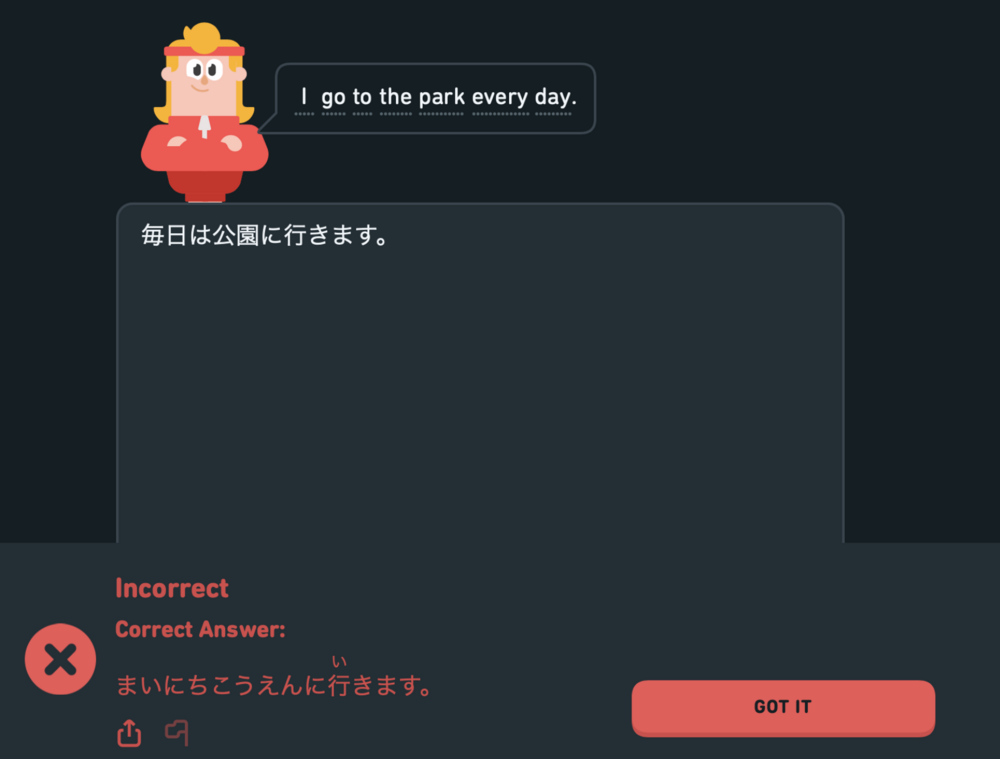掲示板 Forums - This answer :
Top > 日本語を勉強しましょう / Let's study Japanese! > Anything About Japanese Getting the posts
Top > 日本語を勉強しましょう / Let's study Japanese! > Anything About Japanese

I was doing this quiz and shouldn't my answer be accepted?!
I'm not a linguist, so take everything I say with a grain of salt, but I'd suggest that:
By adding the は here (which is an unusual thing to do), you're treating 毎日 as a topic and a noun.
Which makes it: As for every day, I go to the park.
Instead of: I go to the park every day. (where "every day" 毎日 is an adverb)
The meanings are close but slightly different. Given the question, I'd probably consider it to be wrong.
I haven't really heard 毎日は as a topic marker either ngl
I'm not a linguist, so take everything I say with a grain of salt, but I'd suggest that:
By adding the は here (which is an unusual thing to do), you're treating 毎日 as a topic and a noun.
Which makes it: As for every day, I go to the park.
Instead of: I go to the park every day. (where "every day" 毎日 is an adverb)
The meanings are close but slightly different. Given the question, I'd probably consider it to be wrong.
But "As for every day, I go to the park" its the same meaning right?
But an adverb is where it describes about the verb...so how is every day an adverb?
I remember finding it kind of interesting that Japanese and English are almost identical in how they do time expressions. What I mean by that is, Japanese only seems to use the particle に if we would use the word "in", "at", "on", etc. in the same sentence written in English. I might be wrong on this, there could be some cases that are different (if there are, please tell me, I'm curious to know too!), but generally that seems to be the case and I think that's such a coincidence, take a look⬇️
Hopefully this helps as a mnemonic at least a little
correct me if i am wrong.
i think it is because は has an exclusionary implication, opposite of も.
so 今日は implies that is about today and not any other day. it is excluding, putting in contrast to other days/topics.
so it's weird to say 毎日は because what are you putting in contrast with if it is every day?
But "As for every day, I go to the park" its the same meaning right?
But an adverb is where it describes about the verb...so how is every day an adverb?
Again, I'm not a linguist, but I would suggest that, in the sentence "I go to the park everyday":
"every day" is an adverb (technically an adverbial phrase) describing how often we are "going". How often are we going? every day
If you replace "every day" with the adverb "frequently" it should be a bit clearer what is going on.
"I go to the park frequently" sounds good, but "As for frequently, I go to the park" sounds very weird.
You could construct sentences with 毎日は where you use "every day" as a noun (where you are talking about what "every day" is, e.g. "Every day is an adventure", or what "every day" is doing), or sentences where you are contrasting the frequency of "every day" with some other frequency, but neither of these are happening in the original sentence.